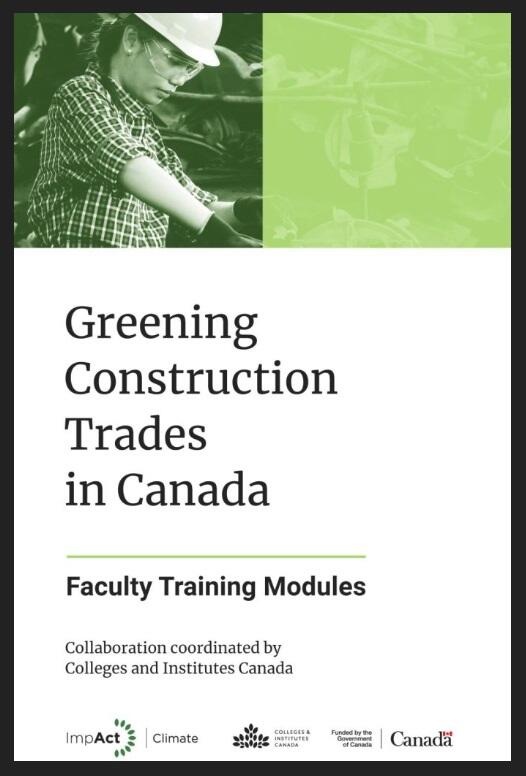Construction trades educators can easily incorporate eco-friendly learning and Indigenous perspectives into their courses with new free training modules from Colleges and Institutes Canada (CICan), developed in part at Conestoga.

Conestoga contributed to new free training modules from Colleges and Institutes Canada (CICan) for construction trades educators to easily incorporate eco-friendly and Indigenous perspectives into their classroom.
CICan released the Green Training Modules for Trades Educators in mid-June that covers four key homebuilding trades: carpentry, electrical, landscaping and HVAC.
Conestoga’s Robert Carder, professor in the Heating, Refrigeration and Air Conditioning Technician program, developed the content and curriculum for the HVAC module.
Educators across Canada are encouraged to integrate the modules into their curriculum, preparing students for pivotal roles in the green economy by teaching climate-smart construction techniques.
“As Canada faces significant housing shortages, these training modules are a timely resource, equipping educators to teach sustainable construction practices and innovative solutions that can accelerate the development of affordable and net-zero housing,” said Pari Johnston, president and chief executive officer of CICan.
“By updating curricula to include both climate change solutions and Indigenous perspectives, we are not just teaching trades; we are empowering a generation of professionals who will drive both cultural inclusivity and long-term environmental stewardship in the housing sector.”
The initiative is part of CICan’s ImpAct-Climate program, funded by Environment and Climate Change Canada, which raises awareness of greenhouse gases and provides CICan members with tools and resources to green campus infrastructure, culture, applied research and curriculum.
The modules were created by trades educators from colleges across Canada, in collaboration with curriculum designers, Indigenous consultants and subject-matter experts in climate action, as well as being peer reviewed.
Green approaches should become integral to the trades and the modules offer concrete actions for tradespeople to take in their daily work, Carder said.
“With the climate change issues associated with carbon emissions in the forefront of most media stories, it’s easy for us as individuals in and out of the trades to be complacent and leave big business and government to protect our environment. These trades modules were created to point to actions that tradespeople can take, whose sum create measurable change and benefit.”
The Conestoga-produced module - Greening and Indigenizing the HVAC Trades - integrates Indigenous knowledge at its core.
“We are in the midst of reconciliation with our Indigenous Peoples and there are two areas of focus that are included in these modules. One, Indigenous Peoples must be able to benefit from the technologies that create healthy environments in their homes and be supported with expertise in their own communities. Two, our Indigenous Peoples have a wealth of knowing and thousands of years of lived experience, balancing their needs with nature that can be resourced in partnership with modern technology to help remediate our environment.”
The Conestoga module covers the broader HVACR industry with residential, commercial and industrial related contexts and content. Carder spoke on a panel introducing the new resource at the CICan national conference held in Calgary from April 29 to May 1.
“Inaction is no longer an option for environmental remediation and authentic Indigenous reconciliation.”
Carder worked with Jenn Gillespie, manager of instructional design in the Online Learning Centre, who had the expertise to build the interactive online training program with the e-learning authoring tool Articulate Rise 360. This platform makes it possible to incorporate content, charts, images, multimedia, branching scenarios and interactive labelled graphics for an immersive learning experience.
“It was a very exciting project and I hope we can continue to explore this tool more at the college,” Gillespie said.
The modules are open access to be freely repurposed and integrated into existing courses, CICan noted.
“Educators across Canada are encouraged to integrate the content into their teaching, preparing students for pivotal roles in the green economy and offering fresh perspectives to tackle both current and emerging challenges in the construction trades.”
Conestoga is a provincial leader in the delivery of skilled trades and apprenticeship training to serve industry needs and growing communities. Programming includes a wide range of programs that provide pathways to employment in trades careers as well as pre-apprenticeship training and in-school training for apprentices. Visit the School of Trades & Apprenticeship for more information.
Sustainability is a key focus at the college, which began in November 2023 developing a comprehensive sustainability plan that will outline strategies to infuse sustainability principles into the college’s academic programs, research, operations and governance.
